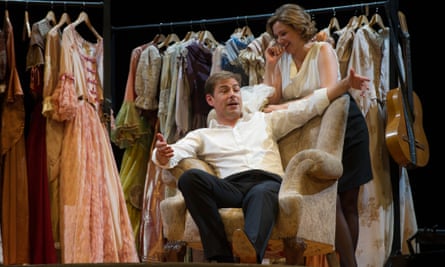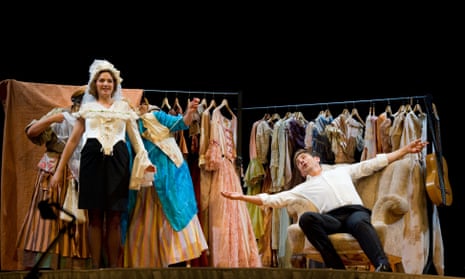“Mozart’s music is extremely theatrical and his theatre is extremely musical,” writes Iván Fischer, conductor and director of this Budapest Festival Orchestra production in the programme notes.
Searching for what he calls “an organic unity” between stage and score, Fischer ditches the pit and places cast and chorus in among the orchestra. The result? Intriguing initially, inspired occasionally and musically exciting in parts. But at heart this is a production so conservative it would never pass muster without the novelty stage layout.
The headline concept is costume. Characters reach for various period outfits – suspended above the stage, hung on rails – that transform them from man to woman, aristocrat to servant and back again. It’s a neat gimmick, but not groundbreaking. More interesting is the social implication of setting orchestra, conductor and singers all on one level. Mozart and Da Ponte based their opera on a Beaumarchais play that had been banned in pre-revolution France for its take-down of aristocratic hierarchy. Fischer’s notion is to take down stage-musical hierarchies.

And he does. My favourite thing about this ‘staged concert’ (his term) is the way it engages the orchestra, whose musicians become a real part of the drama. Wigs are plopped on violinists’ heads, characters whisper vexed asides to the harpsichordist. In that sense Fischer has achieved his unity: there’s a palpable ensemble feel that extends to every person on stage. Musical entries were rough on opening night, but the sound this orchestra makes, the agency, colour and charisma from all players, is a joy to hear. Fischer himself seems to feel the music in whole-body gestures as much as conduct it. He roams the stage or sits with the violins. He occasionally gets involved in the opera’s banter, constantly shifting the parameters of the fourth wall. He’s relaxed, evidently enjoying the whole thing, and the shapely, warm, lyrical music making reflects that.
Miah Persson’s Countess is glamorous and crestfallen, vocally understated and a touch flat in key arias. Sylvia Schwartz is a dignified, undemonstrative Susanna; that she happens to be pregnant herself gives an added twist to the wedding proceedings. Hanno Müller-Brachmann’s Figaro is lusty and robust but a little wooden; Markus Werba’s ability to harden the edge of his voice brings extra cruelty to Almaviva. Altogether the cast is good but never develops much chemistry. For all its surface innovation, in many ways his production is utterly by the book.

Comments (…)
Sign in or create your Guardian account to join the discussion